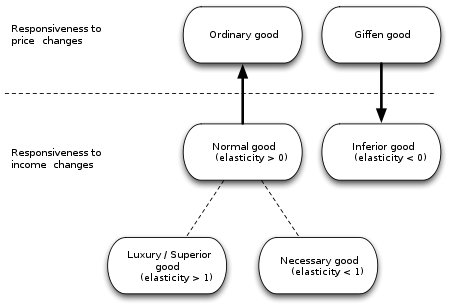- Good (economics)
-
In economics, a good is something that is intended to satisfy some wants or needs of a consumer and thus has economic utility. It is normally used in the plural form—goods—to denote tangible commodities such as products and materials.
Although in economic theory all goods are considered tangible, in real world certain classes of goods, such as information, may only exist in intangible forms. For example, among other goods an apple is a tangible object, while news belongs to an intangible class of goods and can be perceived only by means of an instrument such as print, broadcast, or computer.
Goods are contrasted with services, which are intangible commodities.
Contents
Utility characteristics of goods
Goods may increase or decrease their utility directly or indirectly and may be described as having marginal utility. Some things are useful, but not scarce enough to have monetary value, such as the Earth's atmosphere, these are referred to as 'free goods'.
In economics, a bad is the opposite of a good. Ultimately, whether an object is a good or a bad depends on each individual consumer and therefore, it is important to realize that not all goods are good all the time and not all goods are goods to all people.
Types of goods
Goods can be defined in a variety of ways, depending on a number of characteristics. For example, goods have price elasticity. An elastic good is one for which there are substitute goods; for example, as pen prices rise, the cross elasticity of demand would result in consumers buying more pencils instead. An inelastic good is one for which there are few or no substitutes, such as tickets to major sporting events[citation needed] or original works by famous artists[citation needed].
Trading of goods
Main article: TradeGoods are capable of being physically delivered to a consumer. Goods that are economic intangibles can only be stored, delivered, and consumed by means of media.
Goods, both tangibles and intangibles, may involve the transfer of product ownership to the consumer. Services do not normally involve transfer of ownership of the service itself, but may involve transfer of ownership of goods developed by a service provider in the course of the service. For example, distributing electricity among consumers is a service provided by an electric utility company. This service can only be experienced through the consumption of electrical energy, which is available in a variety of voltages and, in this case, is the economic goods produced by the electric utility company . While the service (namely, distribution of electrical energy) is a process that remains in its entirety in the ownership of the electric service provider, the goods (namely, electric energy) is the object of ownership transfer. The consumer becomes electric energy owner by purchase and may use it for any lawful purposes just like any other goods.
See also
Notes
References
- Bannock, Graham et al. (1997). Dictionary of Economics, Penguin Books.
- Milgate, Murray (1987), "goods and commodities," The New Palgrave: A Dictionary of Economics, v. 2, pp. 546–48. Includes historical and contemporary uses of the terms in economics.
Types of goods public good - private good (includes household goods) - common good - common-pool resource - club good - anti-rival good
(non-)rivalrous good and (non-)excludable good
complementary good vs. substitute good vs. independent good
free good vs. positional good(non-)durable good - intermediate good (producer good) - final good - capital good
inferior good - normal good - neutral good - ordinary good - Giffen good - luxury good - Veblen good - superior good
search good - (post-)experience good - credence good
damaged good - composite good - intangible goodCategories:- Goods
- Consumer theory
- Supply chain management terms
Wikimedia Foundation. 2010.

